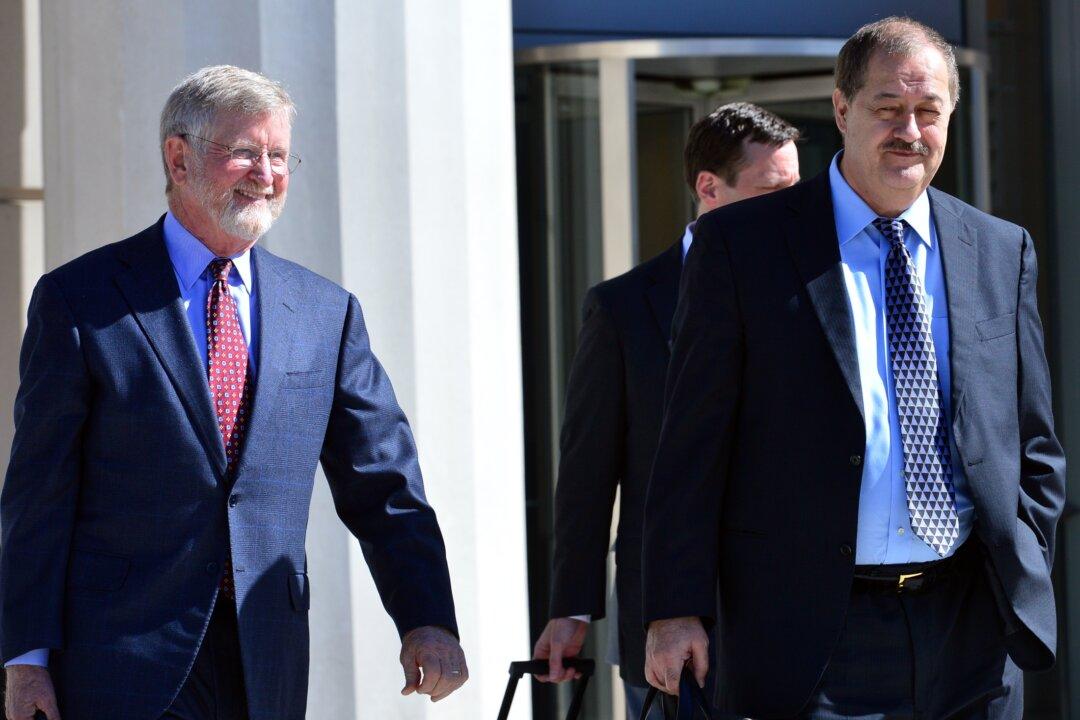CHARLESTON, W.Va.—An outspoken critic of President Barack Obama, charged with conspiring to violate mine safety rules before a deadly explosion, is under orders not to tell jurors he’s being persecuted by Democrats.
The federal judge also warned former Massey Energy CEO Don Blankenship that safety rules are not on trial.
But Blankenship hasn’t checked his Republican politics at the courtroom door, and three weeks into his trial, the coal boss’s lawyers have found ways to repeatedly suggest to jurors that regulators targeted his company for political reasons.
Blankenship, whose unabashed bankrolling of West Virginia Republicans once inspired a John Grisham novel, “The Appeal,” was an active blogger before the trial, blaming the nation’s problems on media liberals, unions, “greeniacs,” and much of corporate America.
In front of the jury, Blankenship’s multimillion-dollar defense team acknowledged his outspoken behavior. Attorney William Taylor said he had been “rude” and “insulting” as he increased Massey Energy’s revenues to $2.3 billion in 2009.
But Taylor suggested that U.S. Mine Safety and Health Administration inspectors targeted Massey’s mines after Obama took office, spending twice as long in Upper Big Branch in 2009 as in 2007, under President George W. Bush.
Taylor also said that regulators demanded ventilation changes “almost impossible to implement” before an explosion killed 29 miners in 2010.
Prosecutors have repeatedly objected to such characterizations as disobeying orders not to put federal regulations on trial.
They also noted that regulators wouldn’t allow Upper Big Branch’s old ventilation standard because of a 2006 fire that killed two people at another Massey mine in West Virginia.
Four investigations blamed the 2010 explosion on worn and broken cutting equipment that created a spark, igniting poorly ventilated coal dust and methane gas. Broken and clogged water sprayers then allowed what should have been a minor flare-up to become an inferno.
Prosecutors are painting him as a micromanager who put profits over safety and was entrenched in the mine’s day-to-day operations.
Blankenship’s defense contends that natural gas caused the tragedy, not the safety violations cited by mine inspectors.
Blankenship, 65, faces up to 30 years in prison if convicted of conspiring to break mine safety laws and lying to financial regulators about safety practices leading up to the deadly blast.
Taylor made a point of describing the former executive’s political leanings in opening statements, despite the judge’s warnings.
“There’s no secret that long before the tragedy at the Upper Big Branch mine he was a controversial man, conservative Republican, dislikes the Obama administration, makes no bones about it, has been willing to spend his money in politics, is critical of government, especially critical of the Mine Safety and Health Administration the way ...,” Taylor said before prosecutors cut him off and Judge Irene Berger sustained the objection.
It’s undisputed that MSHA cracked down on repeat mining law violators under Obama, whose renewable energy policies represent a threat to coal, long the mainstay of West Virginia’s economy.
“They’re going to try to hold MSHA responsible for a lot of things,” said former assistant prosecutor Mike Hissam, who helped investigate the Upper Big Branch mine before joining Bailey & Glasser as a defense attorney. “They’re going to focus on increased enforcement by MSHA at UBB in 2009, which happens to be when the administration changed (to Obama).”
Congressional Republicans sought to eliminate the MSHA in 1995, but cracking down had more bipartisan appeal after the 2010 explosion caused the worst U.S. death toll in four decades.
In a congressional subcommittee meeting on mine safety Wednesday, Rep. Tim Walberg, R-Michigan, mentioned Blankenship’s trial and called Upper Big Branch “a painful reminder of what happens when bad actors put profit before safety.”
Massey did think regulators had a bad attitude, but the feeling was mutual.
In memos after Obama took office, Blankenship described the increased enforcement and fines as a “new and frightening challenge.” Inspectors were seemingly always at Upper Big Branch, and one of them characterized Massey in a 2009 memo as one of the “biggest bullies on the block,” the defense said.
Some inspectors decide they want to be bullies as well, and allege safety violations in situations where other inspectors might disagree, Taylor said. It’s inevitable that coal mines will be cited, but Massey and MSHA experienced mutual and “continuing hostility,” he said.
Blankenship’s attorneys had tried to get the case dismissed by arguing that U.S. Attorney Booth Goodwin, the son of the state’s former Democratic Party chairman, pursued the charges at the behest of Blankenship’s longtime foe, Democratic U.S. Sen. Joe Manchin, who was livid over being included in a video that sought to shift blame for the tragedy.
Prosecutors responded that the idea that Blankenship “was charged because of a YouTube video is incredible,” and that evidence of his crimes is “conclusive.”
Blankenship always was quick to write checks for West Virginia’s Republican politicians. In 2004, he spent $3.5 million to oust a sitting state Supreme Court justice, effectively avoiding a $50 million verdict against Massey.
In 2005, he spent $650,000 to defeat a bond issue prioritized by then-Gov. Joe Manchin. And in 2006, Blankenship spent $6 million in a failed attempt to flip the state Legislature from Democrat to Republican.





